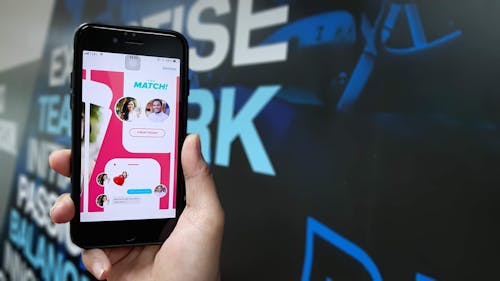Using swipe-based dating apps won't lead to happily ever after

It’s no secret that dating apps have become a staple in our society, especially for millennials and members of Generation Z. Approximately 53 percent of adults in the U.S. between the ages of 18 and 29 have used a dating site or app at some point in their lives, according to recent findings from the Pew Research Center.
When thirsty Rutgers students search for a casual hookup or potential partner, they often turn to apps like Tinder, Bumble or Hinge. Easier than meeting people at a bar or in class, these apps can make it extremely simple to connect with someone.
With that being said, these connections often only last for a steamy one-night stand or maybe a few dates at most. For those searching for a long-lasting and in-depth match, dating apps can be kind of frustrating.
While there are some great success stories out there, only 1 in 5 partnered adults under the age of 30 in the U.S. were introduced to their current significant other through a dating app.
As these apps continue to rack up active users on campus, it’s important to question whether they really lead to love or are just a waste of time. I think a big part of this answer lies in these apps' algorithms and how they actually work.
"The big dating apps have proprietary matching algorithms that they’re famously cagey about, but most rely on a combination of stated preferences — what you tell the app you want in a partner, either explicitly in your settings or implicitly through engagement — and something called collaborative filtering," according to an article from Wired U.K.
Collaborative filtering refers to how dating apps try to find patterns in the individuals who users have previously approved or disapproved of. They then use this data to essentially predict who you're going to like — similar to how TikTok creates a user’s "For You Page." While sometimes this method leads to a good match, other times, it's like a shot in the dark.
In terms of how specific dating apps operate, each has its own variations, but generally, they can be split into two categories: swipe-based (think Tinder, Bumble and Hinge) and algorithm-based (think Match, OkCupid and eHarmony).
Swipe-based dating apps are typically more focused on photos, appearance, profiles and making quick connections. Whereas algorithm-based apps tend to "take a more scientific approach to matchmaking, using algorithms to identify compatibility and help users find partners more likely to be a good match for them."
Because of this difference in mechanics, swipe-based apps are often deemed as more superficial and really only useful for hookups or short-term connections — these are the apps that Gen Z and millennials often use the most.
"Tinder says that it looks at things like app usage, profile details and swipe history to find your matches. Bumble also says it looks at your swipe history, while Hinge didn’t say much, except that its proprietary algorithm was based on work done by two Nobel Prize-winning mathematicians," according to an article from The Verge.
A common claim amongst these apps is that the more you use them, the better they know you and the better they can make predictions based on your preferences. Tinder itself even stated in a blog post that "the most important thing a user can do is ... use the app."
While this does make sense, it also seems highly counterintuitive. Who wants to willingly spend hours on a dating app before the algorithm can effectively make reliable predictions? Shouldn’t it be designed from the start to be conducive to creating the connections people sign up to gain? Rather, people are expected to make a few poor matches and even go on some bad dates before they can find a proper match.
As great as it sounds that we have these algorithms capable of producing potential matches, we as a society put little effort into understanding how they actually work or how they are impacting our daily lives.
Love and human connections are not things that are easily predictable via algorithms. I feel like we tend to hear the word "algorithm" and automatically trust its components without question. Though, just because they are scientific and complex does not mean they can be blindly trusted.
I think mathematician and data scientist Cathy O'Neil describes this sentiment perfectly in her 2017 TED Talk, "The era of blind faith in big data must end." At the end of the day, algorithms are designed by people and can be naturally flawed or biased as a result. We have to do better at understanding how they make up our society or at least pay more attention to them.
With regard to dating apps specifically, "O’Neil says she thinks that if daters really knew how basic the algorithms are, they might not put so much blind faith into them," according to the Verge article.
The lack of transparency about the inner workings of the dating apps we put our trust and vulnerability into on a daily basis is concerning. And if you’re looking for anything other than a hookup on these swipe-based apps, it’s pretty likely you’re not going to find it.
My verdict? I’m not swiping right.



